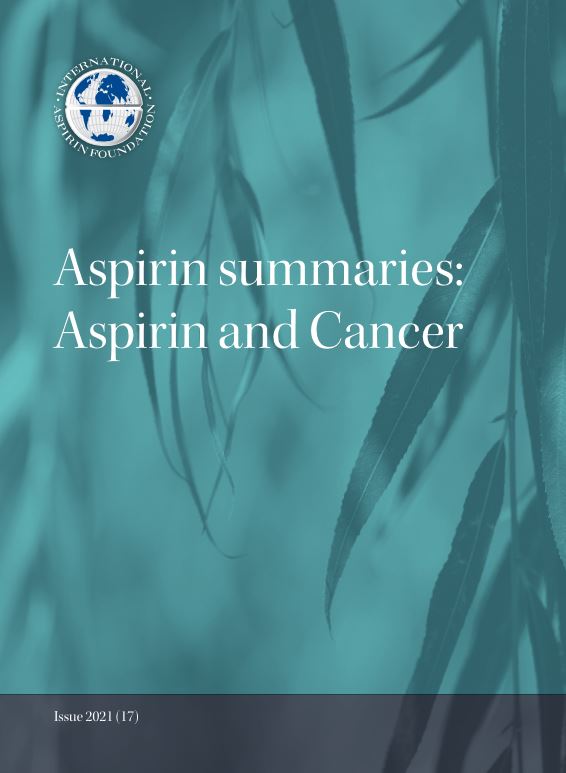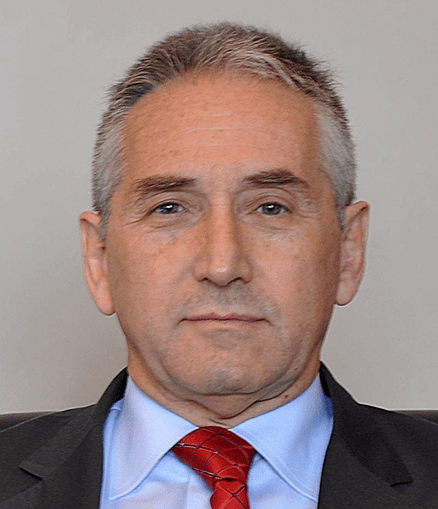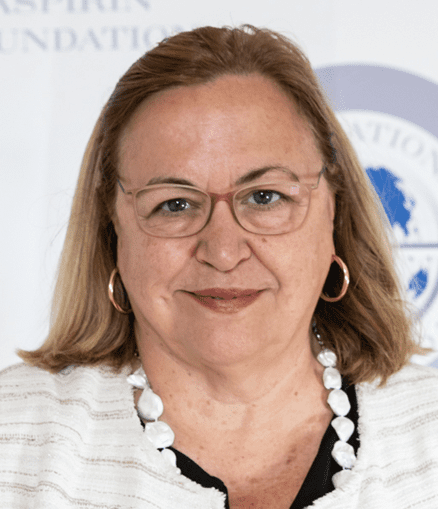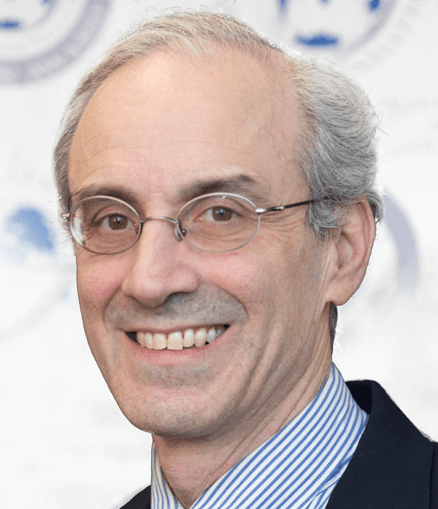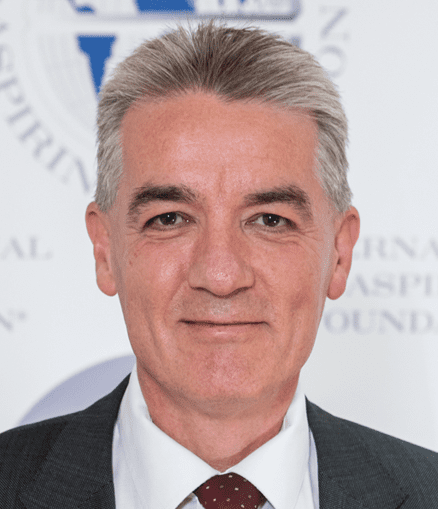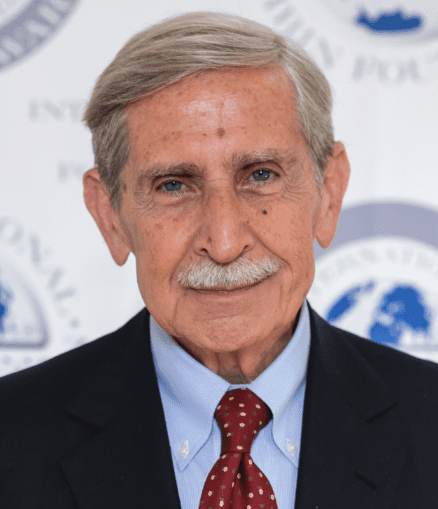Aspirin Summaries Issue 17 : Aspirin and cancer
The last year has seen a lot of research interest in aspirin use for cancer prevention and management. Despite the disappointment of the new USPSTF draft guidance removing a recommendation of aspirin for CRC prevention, the evidence base for aspirin’s role in cancer prevention has continued to grow. The timing and duration of aspirin use in order to gain a benefit appears to be important and work is also underway looking at potential biomarkers to help identify those most likely to benefit and to help develop a more precision style of management.
“ It is unfortunate that the USPSTF removed the rationale for considering low dose aspirin for prevention of colorectal cancer given how compelling the data are from randomized trials of colon polyp prevention, cancer prevention in individuals with hereditary colon cancer, and long-term follow up of several aspirin trials done for cardiovascular prevention.Although recent trials have not been as supportive, they are limited by short duration of treatment and follow-up as well as a focus on only specific populations. I think the decision to take aspirin for prevention of cancer should remain individualized.”
Professor Andrew Chan, International Aspirin Foundation Scientific Advisory Board
The SITA (Should I take aspirin?) trial has been set up in Australia to help evaluate the utility of a decision aid booklet to help facilitate informed choices for people who may like to take aspirin to lower their colorectal cancer (CRC) and other chronic disease risk 1. This move to help patients make fully informed decisions will be a useful clinical tool if validated in this trial and will help to individualize disease prevention decisions.
Colorectal cancer was the third most common cause of cancer globally in 2020 but the second most common cause of cancer death2. Finding safe, effective, affordable and convenient chemopreventative strategies is therefore of great importance and some of the new research is detailed in the summaries below.
Another area of interest is the potential role of aspirin in reducing the risk of hepatocellular carcinoma (HCC). In 2020 primary liver cancer, which includes HCC (75-85%) and intrahepatic cholangiocarcinoma (10-15%), was the sixth most common cancer diagnosis and the third leading cause of cancer death2 . The prognosis for those diagnosed with HCC is poor with a 12% five-year survival rate 3,4. These figures make preventative strategies very appealing. In a metanalysis of seven cohort studies including 120,945 patients with hepatitis B (HBV) or hepatitis C infection aspirin use was found to be independently associated with a decreased risk of developing hepatocellular carcinoma (HCC). The authors concluded that large scale randomized controlled trials would be needed to validate these results 5. Further work is detailed in the summary below along with some work looking at a potential role for aspirin in other cancers.
References
- SITA trail registration ACTRN12620001003965 the Australian Clinical trials Registry (ANZCTR) https://www.anzctr.org.au/Trial/Registration?TrialReview.aspx?ACTRN=1260001003965
- Sung H, Ferlay J, Siegel RL et al. Global Cancer Statistics 2020: GLOBOCAN Estimates of incidence and mortality worldwide for 36 cancer in 185 countries. CA.A Cancer journal for Clinicians. 2021;71(3):209-249
- Lepage C Capocaccia R Hackl M et al Survival in patients with primary liver cancer, gallbladder and extrahepatic biliary tract cancer and pancreatic cancer in Europe 1999-2007:results of EUROCARE -5. Eur j Cancer 2015;51:2169-2178.
- Tan D, Yopp A, Beg MS et al meta-analysis: underutilisation and disparities of treatment among patients with hepatocellular carcinoma in the United States. Ailment Pharmacol Ther 2013;38:703-712
- Li X, Wu S and Yu Y Aspirin use and the incidence of hepatocellular carcinoma in patients with hepatitis B virus or hepatitis C virus infection: A meta-analysis of cohort studies. Front Med. 7:569759. Doi:10.3389/fmed.2020.569759
Aspirin and CRC prevention – a review
This review article seeks to summarise key questions that remain around aspirin and colorectal cancer (CRC) prevention and suggest precision preventative approaches. Aspirin’s role in prevention according to age is addressed and emerging evidence regarding the role of the gut microbiota explored.
Evidence from meta-analysis and systematic reviews have estimated that aspirin can reduce the risk of CRC by around 20-30%. The evidence suggested taking aspirin regularly for at least a decade is important to benefit from these cancer prevention effects. It is unclear if this is because of a legacy effect where aspirin use in the past gives a future benefit or because it takes 5-10 years for an early cancerous lesion to develop into CRC.
The review paper asks and explores the following questions:
- What is the impact of age on aspirin chemoprevention?
- What is the optimal age to commence a prevention regimen?
- What is the overall risk/benefit ratio of an aspirin regimen?
- What is aspirin’s mechanism of action?
Knowledge gaps exist regarding the mechanism of action for most chemoprevention strategies and by understanding the molecular mechanisms behind cancer prevention strategies will help clinicians and scientists succeed in developing ‘precision’ prevention strategies. Being able to identify modifiable biomarkers will be key to developing a precision chemoprevention approach. One biomarker that shows promise especially in aspirin chemoprevention is urinary PGE-M.
The gut microbiome plays an important role in gut homeostasis, host immune activity and intestinal stem cell proliferation/regeneration and may play a role in colorectal cancer development. The gut microbiome may play a role in aspirin absorption, but aspirin may also lead to enrichment of beneficial bacteria and reduction in those involved with tumour development.
The authors state:
“The future for aspirin chemoprevention is bright, with additional studies building upon the existing evidence base. Based on this strong foundation and acceptance of aspirin as a protective agent, research can truly pivot from focusing on establishing a preventative benefit for all individuals to identification of personal characteristics including biomarkers, to tailor prevention strategies.”
For further information please see:
Drew DA and Chan AT. Aspirin in the prevention of colorectal neoplasia. Annu.Rev.Med. 2021. 72: 415-430. www.annualreviews.org
Aspirin use in patients with rectal cancer undergoing chemoradiation therapy is associated with better outcomes
This study set out to explore whether taking aspirin during active treatment for rectal cancer improved outcomes for patients and to find out if this was linked to certain mutations or would benefit all patients with rectal cancer. The study included 147 patients treated in a single centre with chemoradiation therapy (CRT) for rectal cancer from 2010 to 2018 with 42 of them taking concurrent aspirin therapy. Surgically resected specimens were used for RNA sequencing and gene set enrichment analysis. Aspirin use was found to be associated with improved tumour control and survival and this was not linked to a genetic type of cancer. Tumour specimens showed that those taking aspirin had a better immune response. This was a small-scale study can be used to help plan mechanistic studies and prospective clinical trials.
The authors conclude:
‘Concurrent aspirin use during neoadjuvant CRT was associated with improved local and distant tumor control leading to significantly improved survival. Neither mutations in KRAS or PI3CKA, nor the levels of COX-2 expression at the time of resection of the residual tumor were predictive of these aspirin benefits.’
For further information please see:
Farrugia MK, Long MD, Mattson DM et al. Concurrent aspirin use is associated with improved outcome in rectal cancer patients who undergo chemoradiation therapy. Cancers 2021; 13, 205. https://doi.org/10.3390/cancers13020205
Both aspirin and ibuprofen use reduce the risk of advanced colorectal adenoma incidence and recurrence.
This prospective study looked at the incidence of adenoma, recurrent adenoma and colorectal cancer in the population-based Prostate, Lung, Colorectal, and Ovarian (PLCO) cancer screening trial. The results showed that aspirin significantly reduced the risk of colorectal cancer risk (CRC) (HR, 0.88 [95% CI, 0.81-0.96];Ptrend <0.0001) when at least 30 pills were taken per month in comparison with less than 4 pills monthly. Using the same pill thresholds iprobrufen was also found to significantly reduce CRC incidence (HR, 0.81[95% CI, 0.70-0.93];Ptrend=0.003).
Participants randomly assigned to the screening arm of the trial had endoscopic examination at baseline and after 3 and 5 years. Recurrence was monitored using follow up data collected on endoscopies over 10 years.
The protective effect offered by aspirin and ibuprofen is seen not only in reduced colorectal cancer incidence but also in a lower risk of incident distal advanced colorectal adenoma (iprobrufen) and recurrent advanced colorectal adenoma (aspirin) making these precursor stages a useful target for preventing progression to malignant disease.
The authors conclude:
‘In this large prospective study with long term follow-up, a beneficial role for not only aspirin, but also ibuprofen, in preventing advanced adenoma and curbing progression to recurrence and cancer among older adults was observed.’’
For further information please see:
Chudy-Onwugaje K, Huang W-Y, Su LJ et al. Aspirin, ibuprofen, and reduced risk of advanced colorectal adenoma incidence and recurrence and colorectal cancer in the PLCO cancer screening trial. Cancer 2021 doi:10.1002/cncr.33623
Aspirin effect on patient-derived normal colon organoids
There is a lot of research supporting the role of aspirin for the chemoprevention of colorectal cancer (CRC) however the mechanism for this is not fully understood. In order to investigate this, researchers used colon organoids from normal mucosal biopsies to perform in vitro aspirin treatment and gain a greater understanding of the transcriptional networks involved in aspirin CRC prevention.
The researchers found that aspirin therapy reduced the transit-amplifying cell population, inhibited prostaglandin synthesis and dysregulated the expression of genes involved in CRC development. The study also demonstrates the usefulness of organoids from normal mucosal specimens for an experimental model on which to test CRC prevention strategies.
For further information please see:
Devall MAM, Drew DA, Dampier CH et al. Transcriptome-wide in vitro effects of aspirin on patient-derived normal colon organoids Cancerprevention research 2021DOI:10.1158/1940-6207.CAPR-21-0041
Timing of aspirin use in colorectal cancer chemoprevention
This large prospective cohort study used data from the Nurses’ Health Study and the Health Professional Follow-up study to investigate the importance of timing with aspirin therapy in order to benefit from cancer chemoprevention.
They found that a clearer benefit was seen after 10 years use and that it took at least 6 years for any suggestion of a benefit to be seen.
The authors suggest the consideration of use of very low doses of aspirin (23-70 mg/day) in people with a life expectancy exceeding 15-20 years and those of older age who have already used aspirin for ten years or more.
The authors conclude:
“ A suggestive benefit necessitates at least 6-10 years and most clearly after 10 years since initiation of aspirin.”
For further information please see:
Zhang Y, Chan AT, Meyerhardt JA and Giovannucci EL. Timing of aspirin use in colorectal cancer chemoprevention: a prospective cohort study. JNCI J Natl Cancer Inst. 2021; 113(7):djab009 doi:10.1093/jnci/djab009
Aspirin use is associated with reduced risk of HCC
This systematic review and meta-analysis of all observational studies published up until September 2020, includes 2,389,019 participants and 20,479 cases of HCC. The researchers explored whether aspirin use reduces the incidence of hepatocellular cancer (HCC) with the aim of also gaining an understanding of the magnitude of risk reduction and find out if this effect was dose or duration dependent.
The results showed that aspirin use was associated with a significantly lower risk of developing HCC (adjusted RR, 0.61;95% CI, 0.51-0.73; P< or = 0.001; I2 =90.4%).
The benefit of aspirin use in reduced HCC incidence was greater in studies that adjusted for concurrent use of other hepatoprotective medications such as statins and/or metformin, studies that accounted for cirrhosis and studies that confirmed HCC with imaging or biopsy. Overall, this study found a significant 39% decrease in HCC incidence with aspirin use. This was similar in Asian and Western populations and in people with or without viral infection with hepatitis. The reduced risk was highly dose and duration dependent with an 8.4 % reduction in risk of HCC found for every year of aspirin use.
The authors sought to calculate the number needed to treat (NNT) with aspirin to prevent one case of HCC. Assuming an HCC incidence of 0.6 per 100 patient years in people with non-cirrhotic chronic hepatitis B (HBV) infection and an observed 39% lower incidence of HCC with aspirin use then the NNT=427. In higher risk cirrhotic patients and a conservative estimate of annual HCC incidence of 2% the NNT is 128.
Only four of the studies included in this metanalysis evaluated bleeding risk with aspirin in this patient population however all four studies were reassuring in that no excess bleeding risk was found with daily aspirin use.
Prospective, well designed, randomised controlled trials will be needed to further validate the safety and efficacy of aspirin for HCC risk reduction, in particular it will be useful to assess aspirin use in people with non-alcoholic fatty liver disease/non-alcoholic related steatohepatitis (NAFLD/NASH) and also establish optimal dose and timing of aspirin use in order to maximise benefit and minimise risk such as gastrointestinal bleeding.
The author concludes:
‘Aspirin use is associated with a significant dose-dependent and duration-dependent reduction in the risk of developing incident HCC.’‘
For further information please see:
Memel ZN, Arvind A, Moninuola M et al. aspirin use is associated with a reduced incidence of hepatocellular carcinoma: A systematic review and meta-analysis. Hepatology Communications 2021; 5: 1133-143. https://aasldpubs.onlinelibrary.wiley.com/doi/full/10.1002/hep4.1640
Aspirin use and other cancers – results from the PLCO cancer screening trial.
In this cohort study, in older adults, data from 139 896 participants in the Prostate, Lung, Colorectal, and Ovarian (PCLO) cancer screening trial was analysed to look for a link between aspirin use and incidence of or survival from breast, bladder, oesophageal, gastric, pancreatic or uterine cancer.
The researchers used univariable and multivariable hazard ratios (HRs) and 95% confidence intervals (CIs) were calculated using Cox proportional regression modelling with adjustment for covariates.
The results showed that aspirin did not appear to reduce the risk of breast, bladder, oesophageal, gastric, pancreatic or uterine cancers. Any aspirin use and aspirin use at least three times a week was associated with improved breast and bladder cancer survival.
The author concludes:
“Our analysis extends the advantages associated with aspirin use to other cancers, such as bladder and breast cancers.”
For further information please see:
Loomans-Kropp HA, Pinsky P and Umar A. Evaluation of aspirin use with cancer incidence and survival among older adults in the prostate, lung, colorectal and ovarian cancer screening trial. JAMA Network Open. 2021;4(1):e2032972. Doi:10.1001/jamanetworkopen.2020.32072
Disclaimers:
• The information, views and opinions expressed are not endorsed or approved by members of The Scientific Advisory Board unless otherwise stated.
• The Information section is compiled using current published information at the time of writing and whilst every effort has been made to avoid errors, professional clinical judgement is required to interpret the information given. The information given is referenced clearly for further analysis as required.
• Every effort is made by the International Aspirin Foundation to see that no misleading or inaccurate data, statement or opinion appear. The International Aspirin Foundation cannot be held responsible for any errors or for any consequences arising from the use of the information.
• The International Aspirin Foundation, its associates and The Scientific Advisory Board accept no liability whatsoever for the consequences of any such inaccurate or misleading data, information, opinion or statement.
• Any information involving drug usage, should only be followed in conjunction with the drug manufacturer’s own published literature in their own country.
• Medical sciences evolve on a continual basis and therefore independent verification of the content should be made.
• The information, views, opinions and any other material provided should not be relied upon as a substitute to professional medical advice in relation to any medical condition. The International Aspirin Foundation, its associates and The Scientific Advisory Board accept no liability whatsoever for any consequences arising from any reliance placed on such information, views, opinions and other materials in lieu of professional medical advice.

